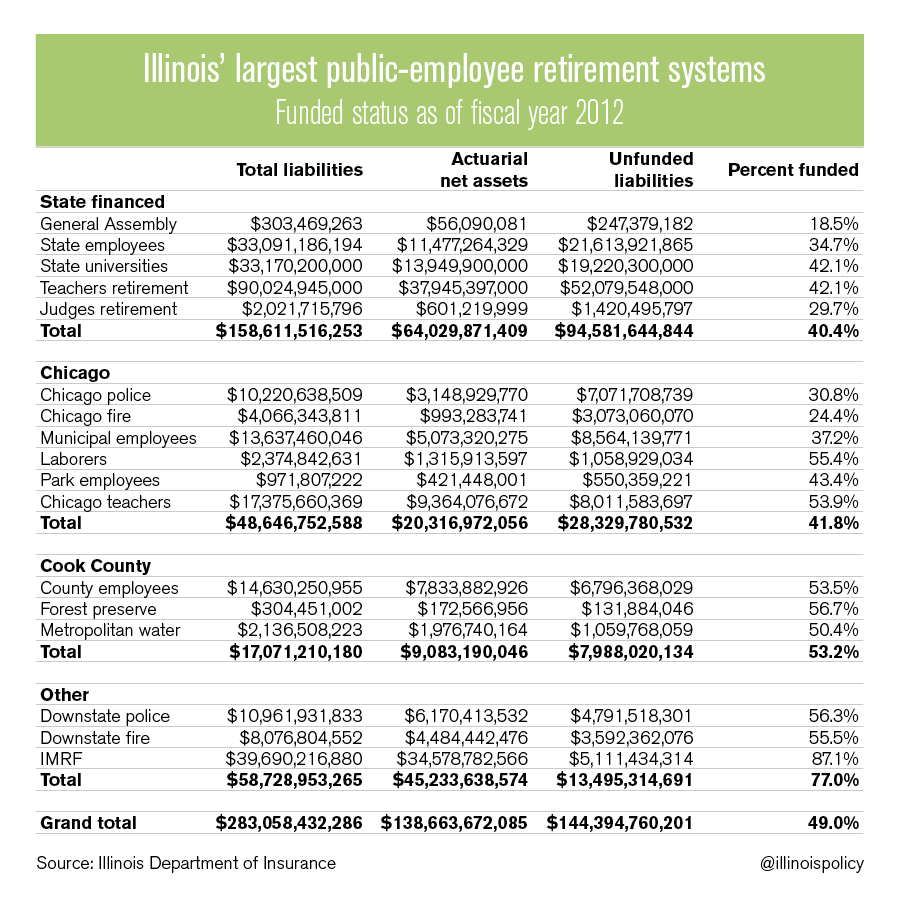The Illinois Supreme Court on Friday unanimously ruled unconstitutional a landmark state pension law that aimed to scale back government worker benefits to erase a massive $105 billion retirement system debt, sending lawmakers and the new governor back to the negotiating table to try to solve the pressing financial issue.
At issue was a December 2013 state law signed by then-Democratic Gov. Pat Quinn that stopped automatic, compounded yearly cost-of-living increases for retirees, extended retirement ages for current state workers and limited the amount of salary used to calculate pension benefits.
Employee unions sued, arguing that the state constitution holds that pension benefits amount to a contractual agreement and once they're bestowed, they cannot be "diminished or impaired." A circuit court judge in Springfield agreed with that assessment in November. State government appealed that decision to the Illinois Supreme Court, arguing that economic necessity forced curbing retirement benefits.
On Friday the justices rejected that argument, saying the law clearly violated what's known as the pension protection clause in the 1970 Illinois Constitution.
"Our economy is and has always been subject to fluctuations, sometimes very extreme fluctuations," Republican Justice Lloyd Karmeier wrote on behalf of all seven justices. "The law was clear that the promised benefits would therefore have to be paid and that the responsibility for providing the state's share of the necessary funding fell squarely on the legislature's shoulders.
"The General Assembly may find itself in crisis, but it is a crisis which other public pension systems managed to avoid and ... it is a crisis for which the General Assembly itself is largely responsible," Karmeier wrote.
"It is our obligation, however, just as it is theirs, to ensure that the law is followed. That is true at all times. It is especially important in times of crisis when, as this case demonstrates, even clear principles and long-standing precedent are threatened. Crisis is not an excuse to abandon the rule of law. It is a summons to defend it," he wrote.
The ruling means Republican Gov. Bruce Rauner and the Democrat-controlled General Assembly will have to come up with a new solution after justices appeared to offer little in the way of wiggle room beyond paying what's owed, which likely would require a tax increase. Coming up with a way to bridge a budget gap of more than $6 billion already was going to be difficult with little more than three weeks before a scheduled May 31 adjournment, and now the pension mess has been added to the mix.
Rauner, who argued during last year's campaign that the law was unconstitutional and didn't go far enough to reduce the pension debt, said the court ruling only reinforces his approach of getting voters to approve a constitutional amendment that "would allow the state to move forward on common-sense pension reforms."
The governor has proposed allowing veteran state workers to keep the current benefits they've earned through a certain date, then move them into a lower-paying benefit plan created for newer state workers. To try to make that approach pass legal muster, he wants lawmakers to put on the ballot a proposed constitutional amendment to clarify that future retirement benefits could be changed.
In its ruling, the court restated that state worker retirement benefits that are promised on the first day of work cannot be later reduced during their term of employment, only increased. But it is unclear whether a change in the constitution could be applied to existing state workers. Even if reluctant lawmakers were to put a measure on the ballot and voters approved it, such a change would spur years of litigation that could involve both state and federal courts.
A coalition of unions that represent government workers and retirees applauded the ruling as protecting "the hard-earned life savings of teachers, police, firefighters, nurses, caregivers and other public service workers and retirees."
"Public service workers are helpers and problem solvers by trade. With the Supreme Court's unanimous ruling, we urge lawmakers to join us in developing a fair and constitutional solution to pension funding, and we remain ready to work with anyone of good faith to do so," Illinois AFL-CIO President Michael Carrigan said in a statement.

